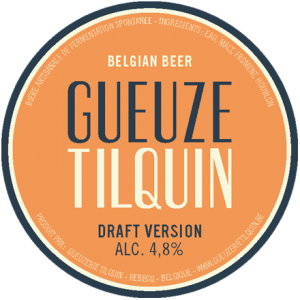Gueuze Tilquin (Draught Version): Difference between revisions
Appearance
| Line 3: | Line 3: | ||
__NOTOC__ | __NOTOC__ | ||
== Description == | == Description == | ||
Gueuze Tilquin (Draught Version) is a gueuze created by blending a low alcohol lambic beer called Meerts (from [[Brouwerij Boon|Boon]]) and one- and two-year old lambics from [[Brouwerij Boon|Boon]], [[Brouwerij Lindemans|Lindemans]], [[Brouwerij Girardin|Girardin]], and [[Brasserie Cantillon|Cantillon]]. According to the blendery, it is comprised of 50% meerts and 50% lambic, in order to keep the ABV down. No 3 year old lambic is in the draught version. The ratio is 50% of meerts, 10% of one-year old lambic, and 40% of two-year old. It is typically 4.8% ABV. | Gueuze Tilquin (Draught Version) is a gueuze created by blending a low alcohol lambic beer called Meerts (from [[Brouwerij Boon|Boon]]) and one- and two-year old lambics from [[Brouwerij Boon|Boon]], [[Brouwerij Lindemans|Lindemans]], [[Brouwerij Girardin|Girardin]], and [[Brasserie Cantillon|Cantillon]]. According to the blendery, it is comprised of 50% meerts and 50% lambic, in order to keep the ABV down. No 3-year-old lambic is in the draught version. The ratio is 50% of meerts, 10% of one-year-old lambic, and 40% of two-year-old. It is typically 4.8% ABV. | ||
== History / Other Notes == | == History / Other Notes == | ||
Revision as of 00:28, 11 May 2017

Description
Gueuze Tilquin (Draught Version) is a gueuze created by blending a low alcohol lambic beer called Meerts (from Boon) and one- and two-year old lambics from Boon, Lindemans, Girardin, and Cantillon. According to the blendery, it is comprised of 50% meerts and 50% lambic, in order to keep the ABV down. No 3-year-old lambic is in the draught version. The ratio is 50% of meerts, 10% of one-year-old lambic, and 40% of two-year-old. It is typically 4.8% ABV.
History / Other Notes
Gueuze Tilquin (Draught Version) is typically put into 20 liter key-kegs and can be found both in Europe and North America. The earliest reviews and references for this beer date to the summer of 2011.